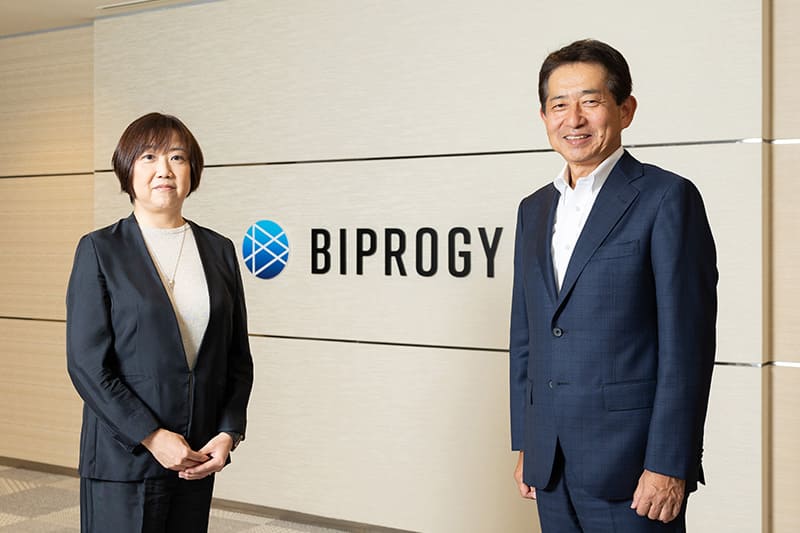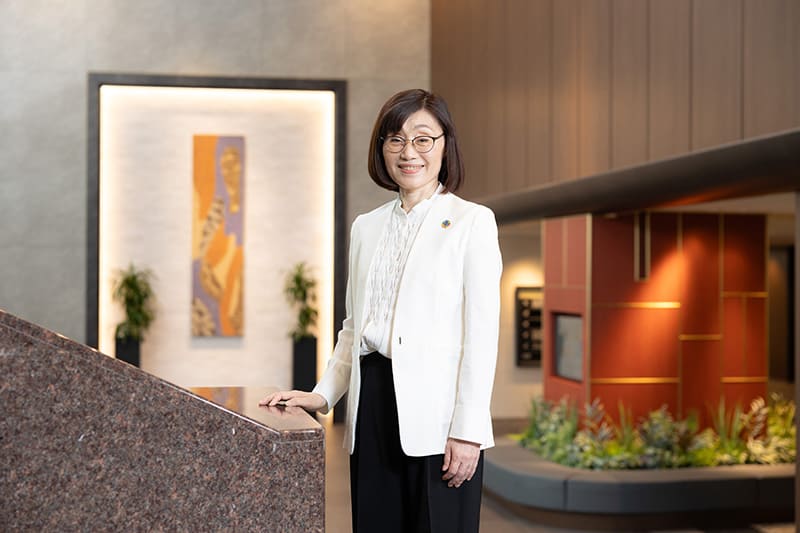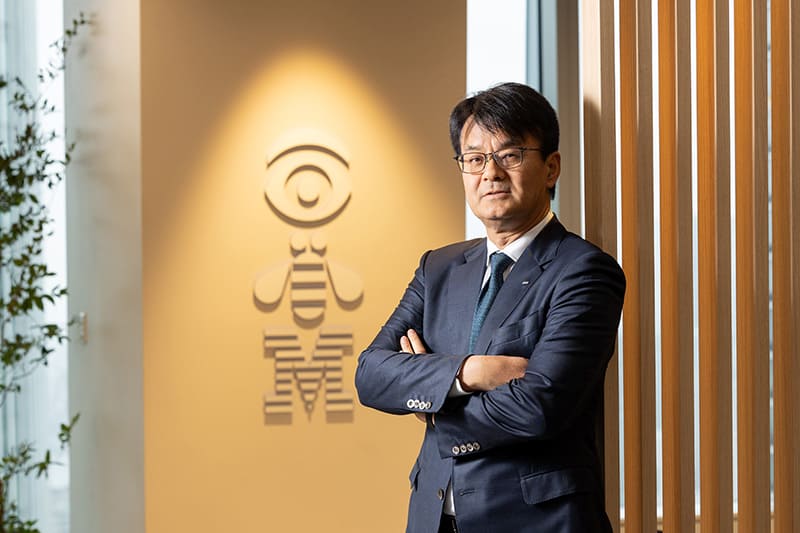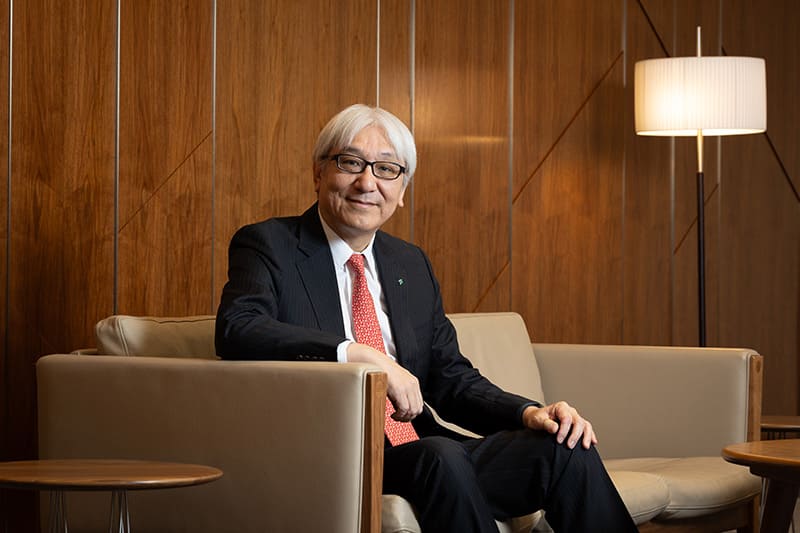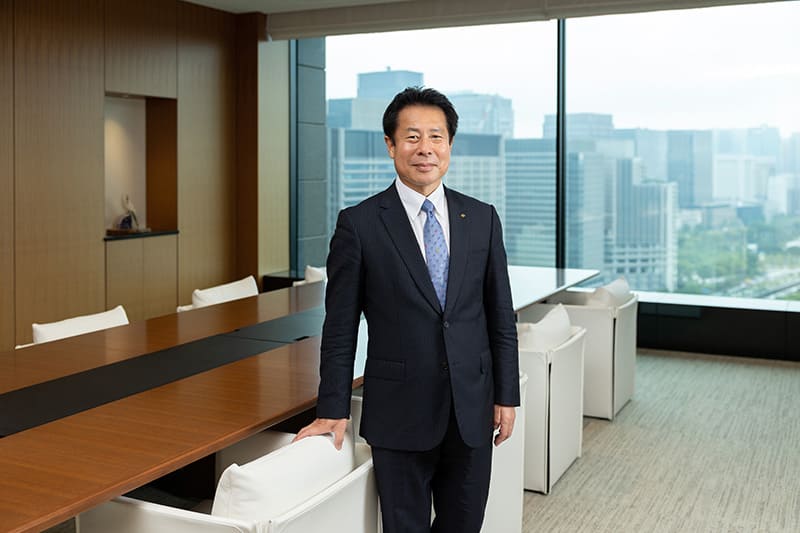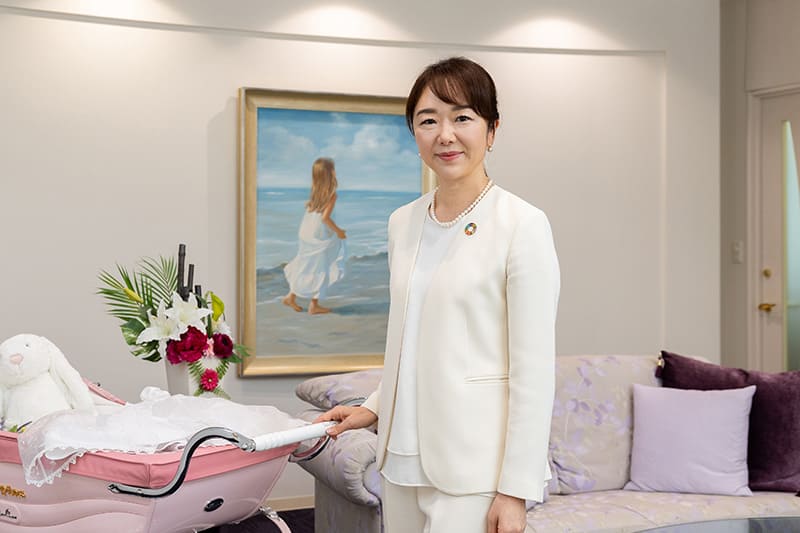October 16, 2023
Teijin cares: Group advances personal, societal health
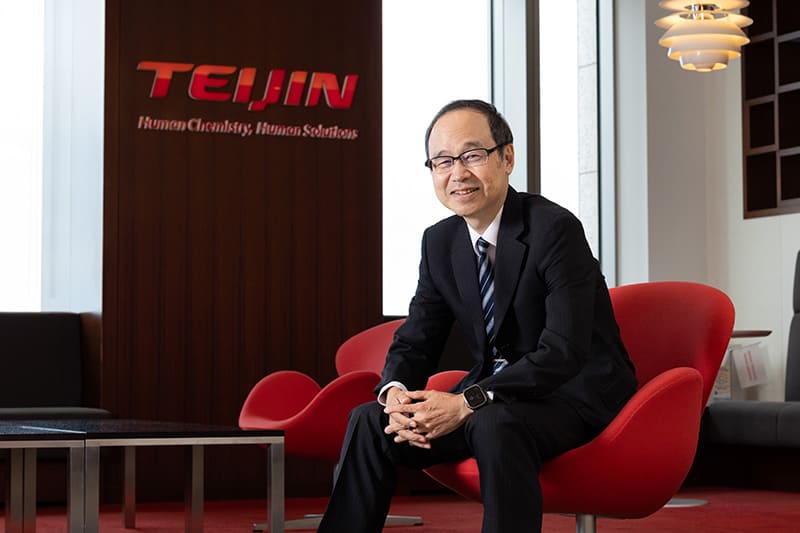
Though Teijin Limited long has been known primarily as a maker of synthetic fibers, its health care business centered on the pharmaceutical and home health care fields has growth potential in Japan’s rapidly graying population as it continues to tap its motivation to work for the benefit of society.
Teijin’s long-term corporate vision, “To be a company that supports the society of the future,” applies not only to its well-known materials segment, but also to its other business pillar, health care, while emphasizing that the company addresses issues of patients, families, and communities in need of more support. And although the company currently is undergoing restructuring and reforms to improve its overall profitability, that vision won’t change.
“The long-term vision leads to sustainability,” Naohiko Moriyama, a senior executive officer and member of the board for Teijin, said in a recent interview, part of a monthly series featuring sustainable Japanese companies by Naonori Kimura, a partner for the firm Industrial Growth Platform Inc.
Teijin’s more than 100-year-old history started when it was founded in 1918. It first grew as a manufacturer of rayon fibers and then expanded and diversified its business fields in the 1970s. Today, its businesses cover a wide range of materials, from aramid-fiber products to resins to carbon-fiber products, and its health care segment manufactures and sells pharmaceuticals and provides medical devices that patients use at home along with related services.
Moriyama stressed the significance of the health care business because it supports people and contributes to society. “Health care is a business for people. It helps them, enriches their lives and helps them recover from illness and lead a healthy life in society,” he said.
He said the health care business brings various benefits not only for other people, but also for Teijin’s employees themselves. In the home health care business, the employees often get to meet patients and health care professionals and hear them saying they are happy to get the medical devices and services they really need. “Hearing one ‘Thank you’ simply makes you feel content. You often get energy by realizing that your work actually helps people. The more you feel you work for people, the more you are empowered, reflecting our corporate motto of ‘Empowering Our People,’” Moriyama said.
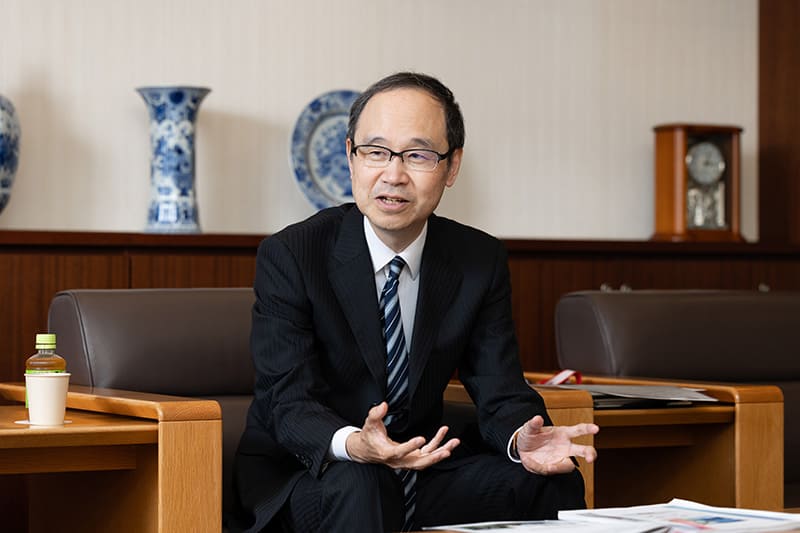
The health care business has been often intertwined with the materials segment in the company’s history. Teijin, which in the 1950s had already started to study materials using polymer chemistry, in the 1970s used that technology to develop an industrial oxygen-enriching membrane. Using the membrane, it manufactured a prototype domestic oxygen concentrator in 1979. In 1982, it entered the HOT (home oxygen therapy) market by providing patients with an improved oxygen concentrator, leading to its position at the top of the domestic market for such services.
Teijin now has hundreds of specialists who can take care of patients 24 hours a day, as well as over a thousand sales employees in its health care business, supporting more than 500,000 patients at home and abroad. “This is an example of how development of the materials business leads to health care business,” Moriyama said.
The company’s oxygen concentrators, combined with HOT services, have met the demand, improving patients’ quality of life and chances of survival. When Teijin entered the HOT market, the potential was large because there was demand for home oxygen concentrators from pulmonary tuberculosis patients who had been hospitalized for years. HOT enabled such patients to take care of themselves at home. Demand for these services grew as the number of patients with breathing problems — technically called, chronic obstructive pulmonary disease — increased as the population aged, Moriyama explained.
The market was also supported by the start of medical insurance reimbursement for HOT in 1985 and by the company’s efforts to operate a nationwide direct sales system — not basically through agents — so that sales staffers could hear as many patients’ voices as possible. In 1991, Teijin developed a monitoring system connected to oxygen concentrators installed at patients’ homes, enabling sales offices to check on the devices’ operating conditions.
The company later introduced retaining because readers are familiar with “CPAP” device for sleep-disordered breathing, which became another market-leading device in Japan.
But working for people and society does not always contribute to high profitability. Also, the business model for services such as HOT is vulnerable to rising labor costs amid labor shortages. Teijin said it made its best possible efforts to reduce the prices of its devices and enriching its services. The introduction of the remote monitoring system for the home medical devices at the early stage of the business is another example of its efforts, it said.
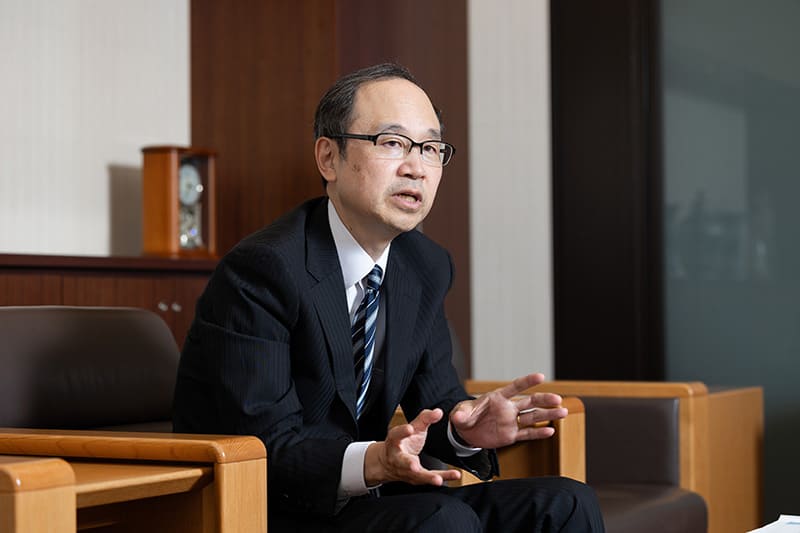
Teijin reported that its operating profit for the fiscal year that ended in March slid to ¥12.9 billion, down 70.9% from a year earlier, although sales grew 10.0% to ¥1.02 trillion. The company said the reasons included a ¥20.4 billion operating deficit in the materials segment due to labor shortages, plus troubles in American and European production plants and a slowdown in the Chinese economy. Sales in the health care business also declined as the replacement of its major pharmaceutical products with generic alternatives moved faster than expected.
Looking at the results, Teijin announced a set of profitability improvement plans that include aiming to improve the operating income of its aramid and composites businesses in the materials segment by ¥30 billion ($200 million) this fiscal year. The company said it was considering the possibility of withdrawing from unprofitable businesses when certain positive changes laid out in the plans are not recognized. The plans also aim to reduce fixed costs in the business by ¥5 billion by fiscal year 2025, and utilize its platforms, such as strong relationships with health care professionals and patients, capabilities in patients’ support, including call centers and home-visit nursing care, that the company has cultivated to expand to new devices and services plus license pharmaceuticals for rare and intractable diseases.
Moriyama, referring to its vision to work on things significant to society even if short-term profitability is not necessarily high, admitted that businesses focusing on solving societal issues often faced criticism inside the company. “But I believe that we should keep addressing issues facing society as a whole and forming close connections with the people involved as our corporate DNA,” he said.
Part of the reason for conducting such a sustainability-oriented enterprise is that it is educational for employees. It also develops long-term relationships with doctors, hospitals and other elements of society.
“Of course, business management based on return on invested capital is important. But I also emphasize what we do for patients and believe it will enhance the corporate value of ourselves in long-term vision when society finds value in it,” Moriyama said.
Naonori Kimura
Industrial Growth Platform Inc. (IGPI) Partner
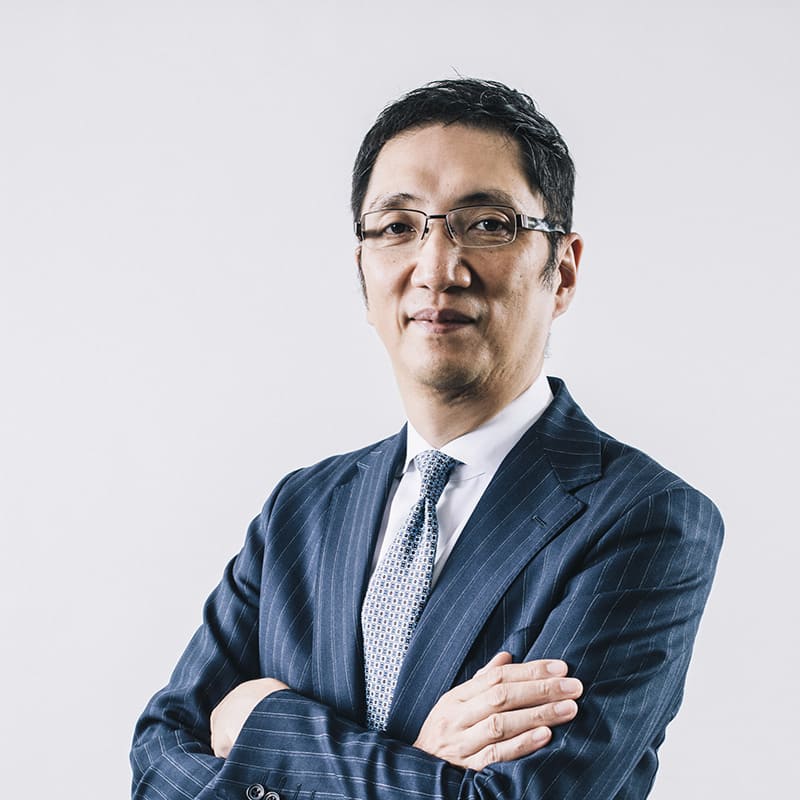
The Teijin group aims “to be a company that supports the society of the future” and develops businesses that provide for the future in various areas of health care with its vision for patients.
Especially with its home oxygen treatments, Teijin has contributed to improving the quality of life and survival rates of patients as a leader in the industry since it started to sell the first such equipment in Japan in 1982. Although home oxygen treatments are becoming common today, I understand that Teijin in the beginning had a number of problems with launching the business due to various regulations and customs. But the group has tenaciously created innovation for patients by working together as one.
Oxygen treatments involve more than just providing equipment. The business is a comprehensive service supported by many workers who care for patients on site. If Teijin focused only on profits, it probably could find other ways of doing this. But as Naohiko Moriyama emphasized, “It would have generated profits, but not a feeling that your job is worthwhile.” Teijin has established a sustainable business model that includes patients, society and employees.
Japan still has a number of issues to solve in the area of health care, but I believe the group will continue to create plenty of businesses and services for people in the future.

